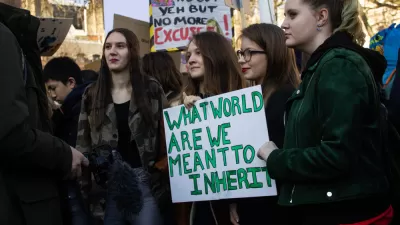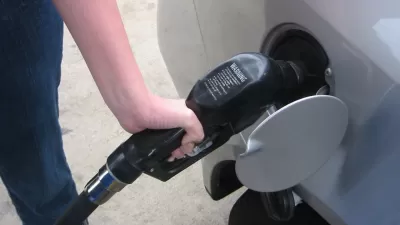Strike three for the federal government in trying to dismiss a lawsuit launched by 21 children in Oregon who sued the Obama administration in 2015, claiming the government was endangering their future because of its failure to reduce climate change.

The Trump administration is not faring as well as major fossil fuel companies who successfully dismissed climate change lawsuits directed against them in federal courts in San Francisco last month and in New York City on July 19. The plaintiffs the administration faces are aged 10 to 21, almost three years older when they originally filed suit.
On July 20, the Ninth U.S. Circuit Court of Appeals in San Francisco rejected the Trump administration’s second attempt to dismiss Juliana v. United States [pdf], a court case filed August 12, 2015, in U.S. District Court for Oregon by Eugene-based Our Children's Trust and Boulder, Colo-based Earth Guardians on behalf of 21 youths.
"Their complaint asserts that, through the government's affirmative actions that cause climate change, it has violated the youngest generation’s constitutional rights to life, liberty, and property, as well as failed to protect essential public trust resources," according to Our Children's Trust.'
"The suit relies on the 'public trust' doctrine, which holds the government responsible for managing natural resources, such as air, land and water, for the benefit of the people," reports Bob Egelko, court reporter for the San Francisco Chronicle, on July 20. "If they prove constitutional violations, the youths want the courts to order the government to establish a carbon-free energy system by midcentury."
It was the Obama administration that first attempted to dismiss the case. CNN reported on Nov. 10, 2016, that Judge Ann Aiken of the U.S. District Court of Oregon denied [pdf] their motion.
In February 2017, "the young people asked their lawyers to go to court and substitute Trump for Obama," reported The Chronicle.
Egelko reported the following month on the Trump's first failed attempt to dismiss Juliana v the U.S.
The Ninth U.S. Circuit Court of Appeals in San Francisco did not delve into the merits of the lawsuit, saying those could be addressed, along with the government’s legal challenges, by the presiding judge as the case proceeds. But by denying the Trump administration’s request to dismiss the suit, the appellate panel moved the suit one step closer to trial in federal court in Oregon.
“There will now be a full trial on climate science and what our federal government did to create this dangerous situation," said Julia Ann Olson of Wild Earth Advocates, lead attorney for the youths.
Olson is now executive director and chief legal counsel for Our Children's Trust.
Fast forward to July 20: The Trump "administration has already asked the U.S. Supreme Court to intervene," adds Egelko.
The administration’s filing this week argued that youths’ “alleged injuries” stem from “emissions from every source in the world over decades,” and that Americans have no constitutional right to “certain climate conditions.”
Asked for comment, the Justice Department referred a reporter to its pending Supreme Court appeal [pdf]. The appeal said the suit was “an attempt to redirect federal environmental and energy policies through the courts rather than through the political process, by asserting a new and unsupported fundamental due process right to certain climate conditions.”
They may find the nation's highest court more receptive than the Ninth Circuit. In his ruling to dismiss New York City's climate change lawsuit against five of the world's largest oil companies, Southern District Court of New York Judge John F. Keenan asserted that "global warming should be solved by Congress and the president—not by the courts."
Then again, Keenan also stated that climate change was not contested by the fossil fuel companies named in the suit, unlike members of the Trump administration as well as the president himself.
Unless the Supreme Court rules otherwise, a trial is set to begin Oct. 29 at the U.S. District Court of Oregon in Eugene.
Correspondent's note: Our Children's Trust lists links to extensive media coverage of Juliana v. United States and other environmental litigation they filed on behalf of children dating back to 2011.
FULL STORY: Court rejects Trump administration’s request to block climate change trial

Planetizen Federal Action Tracker
A weekly monitor of how Trump’s orders and actions are impacting planners and planning in America.

Restaurant Patios Were a Pandemic Win — Why Were They so Hard to Keep?
Social distancing requirements and changes in travel patterns prompted cities to pilot new uses for street and sidewalk space. Then it got complicated.

Map: Where Senate Republicans Want to Sell Your Public Lands
For public land advocates, the Senate Republicans’ proposal to sell millions of acres of public land in the West is “the biggest fight of their careers.”

Maui's Vacation Rental Debate Turns Ugly
Verbal attacks, misinformation campaigns and fistfights plague a high-stakes debate to convert thousands of vacation rentals into long-term housing.

San Francisco Suspends Traffic Calming Amidst Record Deaths
Citing “a challenging fiscal landscape,” the city will cease the program on the heels of 42 traffic deaths, including 24 pedestrians.

California Homeless Arrests, Citations Spike After Ruling
An investigation reveals that anti-homeless actions increased up to 500% after Grants Pass v. Johnson — even in cities claiming no policy change.
Urban Design for Planners 1: Software Tools
This six-course series explores essential urban design concepts using open source software and equips planners with the tools they need to participate fully in the urban design process.
Planning for Universal Design
Learn the tools for implementing Universal Design in planning regulations.
Heyer Gruel & Associates PA
JM Goldson LLC
Custer County Colorado
City of Camden Redevelopment Agency
City of Astoria
Transportation Research & Education Center (TREC) at Portland State University
Camden Redevelopment Agency
City of Claremont
Municipality of Princeton (NJ)





























